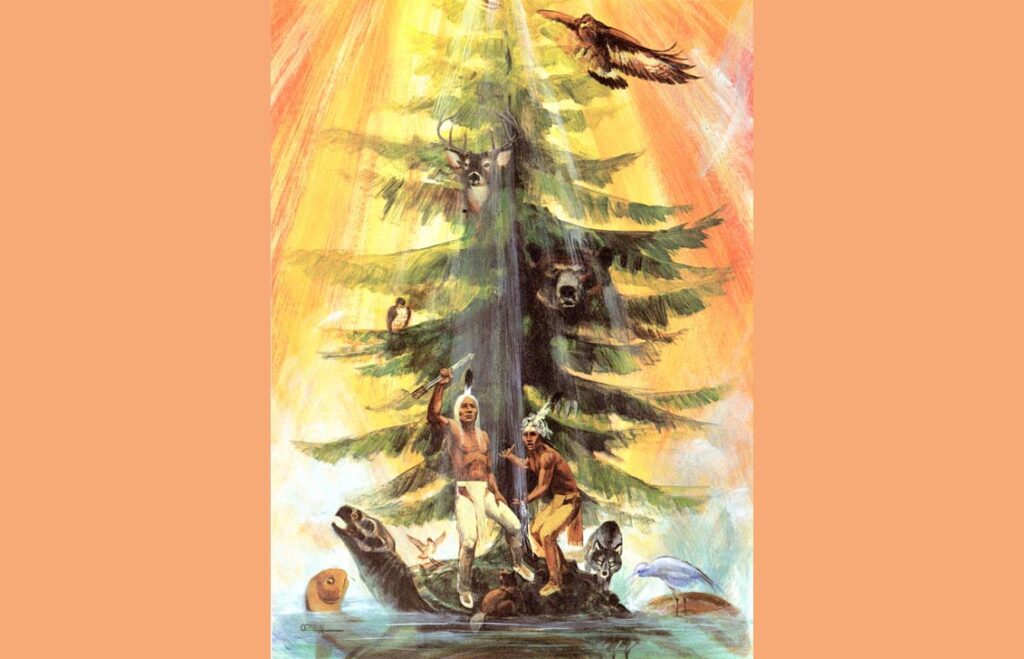
Every time people listen to an elder describe the Great Law, they say they learn something new.
What normally takes about 11 days was briefly described in less than two hours during the second of an online community wellness series, this time hosted by noted elder, knowledge keeper and Mohawk sub-chief Tom Porter.
Porter started by noting that the Great Law – or set of instructions provided by the Creator – doesn’t really translate to the words “Great Law” from Mohawk to English.
It’s closer to big, huge, gigantic, good nice, he said.
“That’s the name of our law”
Also, people are accustomed to calling longhouse leaders Chiefs, which he said is “derogatory.”
“’Chiefs’ is kind of degrading because our law doesn’t really mean that. Chief has the connotation of ‘the buck stops here.’ Our way of life doesn’t have nothing to do with that.”
The Royaner – the Mohawk word for Chiefs in the Longhouse – could really translate to “the people who are of the good or nice” said Porter.
Porter pointed out that many people dispute when the Great Law was revealed to the Haudenosaunee people – some say 500 years ago, some say 1,000 years ago while Porter believes it’s closer to 2,000 years ago, according to his experience and teachings.
“Because of the things they were able to do, there’s no way they could have done all that in just a thousand years,” said Porter.
“In the beginning of the world the Creator gave us our instructions. We came from another place, somewhere in the Skyworld. When our great-great grandmother came here to begin the human life on this planet from the Skyworld that’s when the Creator instructed us on how we are supposed to live and how we are supposed to behave. All you got to do is listen to the elders when they have a grand council meeting or any meeting at the longhouse they will do a speech- in general English they refer to it as the opening prayer or thanksgiving address.”
He said the Thanksgiving Address should really translate to “before, in front of it, the issues that are important.”
The Thanksgiving Address is still spoken before many meetings today in Haudenosaunee communities.
“No matter how much colonization came…we never sold out we never quit that. We’re still doing that.”
Porter spoke of how new Haudenosaunee babies are introduced to Mother Earth, the thunders, the moon, the sun, etc. to create a relationship with them and respect the earth while they’re here.
The older brother or uncle of the baby introduces the baby three times to all the plants, the earth, the moon, the sun, the earth, etc. he said.
Porter spoke of the birth of the Peacemaker who was born to bring peace to the warring nations.
He was born to a woman who was impregnated by the Creator. Her mother was upset and banished the girl to give birth to the Peacemaker by herself. The grandmother of the Peacemaker tried to kill the baby several times, said Porter, before finally realizing the baby was special and accepting the boy as her grandson.
The grandmother and mother eventually apologized and begged her daughter for forgiveness. Porter said the story is a good example of forgiveness and promised she would never hurt her grandson again.
“The daughter was so happy because all these months she was mistreated. She was so lonesome for her mother. And from that part of the story it tells in our Great Law about forgiveness, how you can make mistakes but if you truly ask for forgiveness that that can happen and it can get better again.”
Porter said the Peacemaker has a name but one is not to utter the name unless under certain circumstances.
“That’s in a nutshell the Great Law,” said Porter. “I skipped lots of things. In the Great Law, he gave us clans. A wolf is not to marry another wolf. A bear and a bear are sisters and brother; a wolf and a wolf are brother and sister. When clanmothers are going to raise leaders, my uncle used to say when babies are born the Creator already predestined if they were going to be chiefs and which women were going to be clanmothers.”
He said the Great Law describes the Chief’s characteristics – spiritually, emotionally and physically.
“That chief or clanmother has to be married to one (person) and stay married,” said Porter. “They have to have children in order for them to be leaders because then they will know what love is and what commitment is. Our leaders have to love their people. They have to communicate with their people. They have to have compassion for their people. And you never have to be afraid to see them…because they are loving people.”
The Great Law also instructs that all decisions made must not hurt the next seven generations from today.
“Isn’t that wonderful?” said Porter. “If all the leaders in the world could do that the world would never end.”
The Great Law says not to gossip and always try to help one another, said Porter.
“Always say good things, be helpful. If someone’s cooking, we help them cook. If somebody’s cutting wood, we help them cut. If somebody’s building a house, we help them build a house. That’s the way the old traditional way is. My uncle used to tell me a real leader waits until all children and elders eat and then if there’s anything left, the chief will eat. They’re the last to be served.”
Porter concluded by saying, “This is really a reader’s digest form of the law. Sometimes when I tell it, I get emotional because it comes alive when I tell it.”






